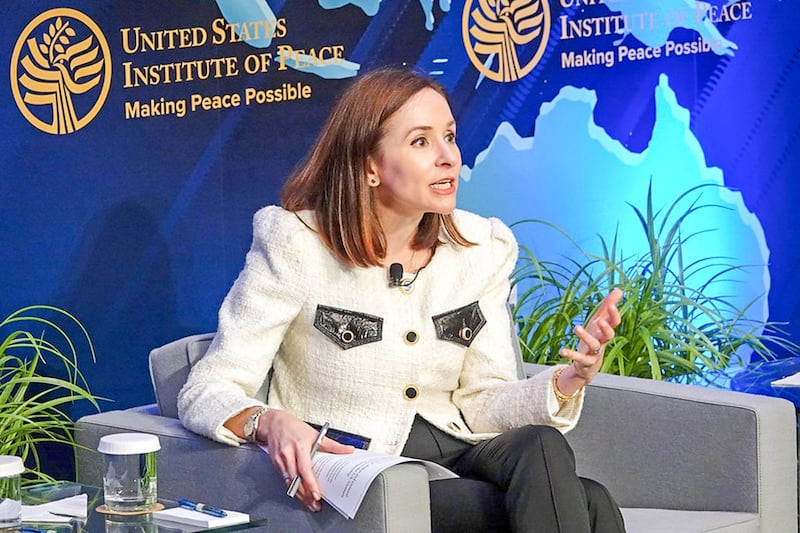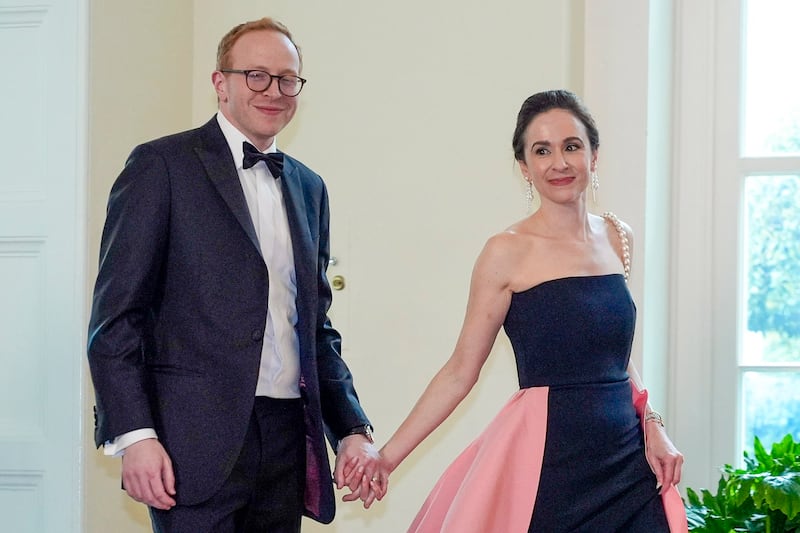Mira Rapp-Hooper is the Special Assistant to the President and Senior Director for East Asia and Oceania at the White House National Security Council, or NSC.
During this week’s NATO Summit in Washington, she spoke with RFA Korean’s Lee Sangmin, touching on points related to increased cooperation between Russia and North Korea, following Vladimir Putin’s visit to North Korea last month.
The summit included representatives from the Indo-Pacific Four, or IP4, an informal grouping of South Korea, Japan, New Zealand and Australia, and Rapp-Hooper said that it was important to include those countries in discussions with NATO, especially considering that the partnership between North Korea and Russia concerns security in both the North Atlantic and the Indo-Pacific.
The interview has been edited for length and clarity.
RFA: So how much are you concerned about the recent deepening relationship between Russia and North Korea?
Rapp-Hooper: We are extremely concerned about the relationship between Russia and North Korea. Of course, we have been for about a year as that relationship has grown closer and closer, and it has become clear that both Russia and North Korea are exchanging extremely worrisome forms of support with one another.
On the one hand, of course, we know that the (Democratic People’s Republic of Korea, or DPRK) has been providing Russia with millions of rounds of ammunition, as well as missiles that have been used on the battlefield in Ukraine to devastating effect fueling Russia’s war machine, and taking the lives of innocent civilians, all over the conflict. And that’s deeply disturbing.
But one of the things that is also very troubling about this relationship is the fact that we know that Russia is probably providing the DPRK with technical assistance, sophisticated forms of support for some of its military programs. But those forms of cooperation are much harder to track. So while we know what the DPRK is giving to Russia, we know less than we would like to about what Russia is giving to the DPRK. And that is something that should concern not only the countries of the Indo-Pacific who care about peace and stability in the Korean Peninsula and beyond.

But countries in Europe are increasingly understanding that this relationship affects them, too. Now, of course, this has all become more prominent recently because of Vladimir Putin’s visit to Pyongyang, when the two countries released a declaration that looks very much like an alliance treaty.
But really, what this does is capture something that we knew the whole time, which is the fact that this is not just a marriage of convenience where these two powers are cooperating so that Russia can get help in its war against Ukraine. There is political buy-in at the highest levels, from both of these governments.
The piece of optimism that I would offer today, however, is that it is not just the ROK, the United States and Japan who are worried about this problem. We have very good trilateral cooperation amongst the three of us to share intelligence and to coordinate our policy actions.
But part of what you’re seeing here at NATO today is that all of our NATO allies also care about this problem, because Russia has brought DPRK technology to Europe in the form of ballistic missiles being used on the battlefield in Ukraine. So we’ve never seen our European allies more engaged in DPRK issues, more wanting to cooperate, to address, and limit, this relationship. And we are hopeful that that cooperation will have a stabilizing effect in the face of all of this destabilizing behavior.
RFA: In what ways can NATO and its allies counter cooperation between North Korea and Russia?
Rapp-Hooper: Well, there are, you know, certain areas where cooperation, unfortunately, is quite difficult to affect. We know that many of the shipments that take place between DPRK and Russia take place within their territorial seas or over rail lines. So there’s very few options for the international community there.
But there are other areas, where we do cooperate, and we will continue to do so. And that relates to things like financial sanctions that may run at the heart of their cooperation, and other measures that we can take, such as intelligence sharing, information sharing that might allow one country to be more empowered to limit this cooperation wherever they can.
There is also, of course, the role that we all play diplomatically, not just in putting pressure on both Pyongyang and Russia, but on additional countries, who might be able to take action to try to limit this relationship.
The world is, of course, watching (the People’s Republic of China, or PRC) and the question looms large, what Beijing will do about this relationship, given that it is so destabilizing and not in China’s interests either. But we’ve yet to see a clear answer to that question.
RFA: What kind of a role can China play in dealing with North Korea issues?
Rapp-Hooper: That’s really up to China. In the past, the PRC has long played a role on the Korean Peninsula. Obviously, it is a key continued trading partner of Pyongyang and a longtime political partner. There is obviously a very close political relationship as well, between Beijing and Moscow – which is its own cause for concern.
But there’s no doubt that if Beijing was interested in doing so, it could play a stabilizing and responsible role, to encourage in particular, the worst (aspects of the) DPRK-Russia cooperation to come to an end. But again, all eyes are on Beijing to see if it will make that choice.
RFA: Why is it significant that the IP4 are participating in the NATO Summit?
Rapp-Hooper: Our IP4 partners in the (Republic of Korea, or ROK), Japan, Australia and New Zealand have been at the last three NATO summits. And from our perspective, it really symbolizes the fact that the Euro-Atlantic and the Indo-Pacific are increasingly connected.
Security problems that matter for Europe matter for the Indo-Pacific. And likewise, Asia matters greatly to our European partners. And when the Biden administration took office, we were very keen to help support the IP4 and build it out into something that is a more institutionalized meeting because we think it is strictly advantageous for our Indo-Pacific allies to be working with our European allies and vice versa.
But of course, the way that the IP4 really got increased, was after the tragic and aggressive invasion of Ukraine by Russia, in which so many of our Indo-Pacific allies stepped up to demonstrate that they stand with Ukraine and would provide assistance. And that, I think, really drove home to our European allies in NATO, the fundamental value of working with partners in the Indo-Pacific. So today, again, they’re here for their third summit.

They have had the opportunity to participate in a plenary session, with significant substantive focus on the Indo-Pacific and the links between the two theaters. When we talk about those links, clearly DPRK-Russia cooperation is very squarely on the agenda. It has been a focus of their discussions. They participated in the leaders dinner last night. They had their own meeting with President Zelensky of Ukraine, which is an important demonstration of the fact that they are fiercely dedicated partners to Ukraine. And you saw that with two new announcements from New Zealand and Australia announcing new aid packages to Ukraine concomitant with the NATO summit.
And then, of course, the IP4 partners, had some time with the president, and Secretary General Stoltenberg, to affirm the importance of their participation here at NATO.
RFA: What role do you expect that South Korea can play in partnership with NATO?
Rapp-Hooper: We expect South Korea to play whatever role is most advantageous for South Korea. I think if you ask our South Korean friends, what they will say is they are extremely worried about DPRK-Russia cooperation, and they want to work with NATO partners to do the most that they can to limit that cooperation.
But really what they want to do is use these interconnections between the region to help keep the Indo-Pacific and the Korean Peninsula safer and more stable, and we're fully supportive of that goal.
RFA: After the summit between North Korea and Russia,there has been growing sentiment in South Korea that it needs its own nuclear weapon. What kind of response would you have to that sentiment?
Rapp-Hooper: Well, what I would actually point to is the fact that President Biden and (South Korean) President Yoon spent some time together today. And after they did so, we released an important joint statement, signed off by each of them. And what that statement does is remind the world that it's been a year since the Nuclear Consultative Group (or NCG) met for the first time in Seoul.
It was inaugurated following President Yoon’s state visit to Washington back in April of 2023. And over the course of that year, that nuclear consultative group has made remarkable progress, towards standing itself up as an institution, and doing the work that we will need to do together, as allies, to strengthen our extended return to the ROK.
Edited by Eugene Whong.
